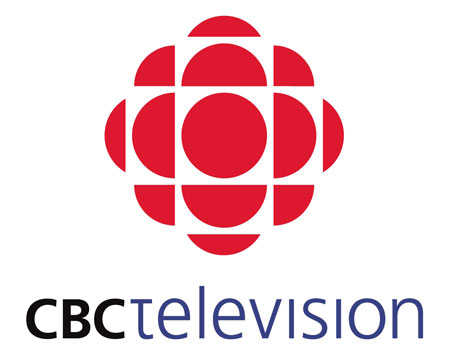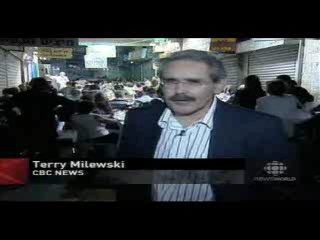| CBC Critically Examines Israel's Enemies September 16, 2008 By: Mike Fegelman Dear HonestReporting Canada subscriber: More often than not, the Canadian and international media have sought fit to report on the Arab-Israeli conflict through the narrow lens of the Israeli-Palestinian conflict. Reporting on the pervasive violence between Israelis and Palestinians, Western journalists employ conventional black and white narratives to a conflict which deserves colour, context, and clarity. Whether as a result of a lowest common denominator way of thinking or due to a lack of contrarian thought, this dogmatic approach adopted by the Mideast media deceives news consumers into thinking they're getting a fair and complete representation of the region. The result: Israel's legitimate security concerns get short shrift, Arab vs. Arab violence gets under reported, and human rights continue to be ignored in the broader Middle East. When our public broadcaster, the CBC, went beyond this Mideast "conventional wisdom" and featured critical reporting on the Iranian nuclear threat and on the dangers of Hamas' rule in Gaza, it's important that we pause, take note, and expose excellence when it's deserving. Iran's Existential Threat to Israel On the August 27 edition of CBC's "The National," reporter Terry Milewski documented what a Persian night in Jerusalem would be like for the over 60,000 Iranian Jews now living in Israel, even though as he acknowledged "Iran's president threatens to wipe Israel off the map." Milewski painstakingly analyzed the existential threat that Iran's nuclear program poses to Israel. He rhetorically asked: "But it's not just the Iranian Jews who are intensely interested in all things Persian. Israel, and the world beyond, is debating the looming question: should Israel strike at Iran's nuclear facilities before the mullahs get the bomb?" To view the full 8-minute report please click here or on the image below: Whether as a result of a lowest common denominator way of thinking or due to a lack of contrarian thought, this dogmatic approach adopted by the Mideast media deceives news consumers into thinking they're getting a fair and complete representation of the region. The result: Israel's legitimate security concerns get short shrift, Arab vs. Arab violence gets under reported, and human rights continue to be ignored in the broader Middle East. When our public broadcaster, the CBC, went beyond this Mideast "conventional wisdom" and featured critical reporting on the Iranian nuclear threat and on the dangers of Hamas' rule in Gaza, it's important that we pause, take note, and expose excellence when it's deserving. Iran's Existential Threat to Israel On the August 27 edition of CBC's "The National," reporter Terry Milewski documented what a Persian night in Jerusalem would be like for the over 60,000 Iranian Jews now living in Israel, even though as he acknowledged "Iran's president threatens to wipe Israel off the map." Milewski painstakingly analyzed the existential threat that Iran's nuclear program poses to Israel. He rhetorically asked: "But it's not just the Iranian Jews who are intensely interested in all things Persian. Israel, and the world beyond, is debating the looming question: should Israel strike at Iran's nuclear facilities before the mullahs get the bomb?" To view the full 8-minute report please click here or on the image below:  On CBC.ca, Milewski adapted this feature segment into a "Report From Abroad." In it he interviewed Menashe Amir who has been broadcasting to Iran on Israel's state-run radio for 48 years. According to the report: "Amir said the West has failed to understand the Iranian threat. He believes the regime is opposed by most Iranians but is consumed by an apocalyptic vision: the triumph of Shia Islam [also known as Shiite] over the world. 'Western governments', he says, don't see that, for the Iranian mullahs, the destruction of the Jewish state is just a step along the way... But Amir points out, on the same day, in the same speech that Ahmadinejad called for wiping off Israel from the map, he added that the destruction of Israel is the first step of our final confrontation with western civilization... Amir says the regime dreams of a new caliphate - an Islamic empire spanning the globe." In focusing a critical lens on the Iranian threat, Milewski's candid and thought provoking analysis brought necessary context to what could be an inevitable military confrontation between Israel and Iran. The Specter of Hamastan On the September 1 and 4 editions of CBC News Sunday and CBC Around the World, Milewski continued his whirlwind trip to the region with a second feature-length report. This time he analyzed the threat that Hamas poses in making the Gaza Strip a full-blown Islamic state. Milewski set the tone of his report with an upfront acknowledgment that Hamas' well-oiled propaganda machine was playing it up for the CBC's cameras: "In Gaza, the Islamic warriors of Hamas are preparing for war. At least it looks like they are, but in truth this is theatre. It's a photo-op to show the foreign media that Hamas is building an army to destroy the state of Israel. Such photo-op's are frequent since Hamas seized power in Gaza last year..." To view the full 5-minute report please click here or on the image below: On CBC.ca, Milewski adapted this feature segment into a "Report From Abroad." In it he interviewed Menashe Amir who has been broadcasting to Iran on Israel's state-run radio for 48 years. According to the report: "Amir said the West has failed to understand the Iranian threat. He believes the regime is opposed by most Iranians but is consumed by an apocalyptic vision: the triumph of Shia Islam [also known as Shiite] over the world. 'Western governments', he says, don't see that, for the Iranian mullahs, the destruction of the Jewish state is just a step along the way... But Amir points out, on the same day, in the same speech that Ahmadinejad called for wiping off Israel from the map, he added that the destruction of Israel is the first step of our final confrontation with western civilization... Amir says the regime dreams of a new caliphate - an Islamic empire spanning the globe." In focusing a critical lens on the Iranian threat, Milewski's candid and thought provoking analysis brought necessary context to what could be an inevitable military confrontation between Israel and Iran. The Specter of Hamastan On the September 1 and 4 editions of CBC News Sunday and CBC Around the World, Milewski continued his whirlwind trip to the region with a second feature-length report. This time he analyzed the threat that Hamas poses in making the Gaza Strip a full-blown Islamic state. Milewski set the tone of his report with an upfront acknowledgment that Hamas' well-oiled propaganda machine was playing it up for the CBC's cameras: "In Gaza, the Islamic warriors of Hamas are preparing for war. At least it looks like they are, but in truth this is theatre. It's a photo-op to show the foreign media that Hamas is building an army to destroy the state of Israel. Such photo-op's are frequent since Hamas seized power in Gaza last year..." To view the full 5-minute report please click here or on the image below:  His exclusive report (which was also adapted on CBC.ca) chronicled Hamas' intimidation of the media and Palestinian society at large, their threats to Palestinian security and stability as Hamas continues to "aim its guns inward." Milewski noted that Hamas really has "no program to end Gaza's isolation," how it refuses to recognize Israel, is boycotted as a terrorist organization, and how ordinary Palestinians desperately want peace with the Jewish state. Milewski's in-depth report saw him secure an exclusive interview with Hamas co-founder Mahmoud Zahar, (see photo above) whose irrational comments were almost laughable. Milewski noted that Zahar "Isn't going to evolve" and that for the "ideologists of Hamas... the goal is the extinction of Israel." In conclusion Milewski boldly notes: "This in a nutshell, is Gaza's problem. Instead of adapting to its environment, Hamas expects the environment to change. As long as Hamas threatens to destroy Israel, Gaza remains isolated and wretched. Many Gazans will blame Hamas as well as Israel. So Hamas may have to keep its guns pointing inward." How You Can Make A Difference It's human nature that we're more likely to criticize than to give acclaim, but when investigative reporting reflects the highest standards of newsgathering, it's important that we recognize excellence. Terry Milewski's recent reporting on the threats that Iran and Hamas pose to Israel deserve to be commended. Please send your considered comments to the CBC's Audience Relations department and refer to Terry Milewski's September 1 report on Hamas and his August 27 report on Iran. His exclusive report (which was also adapted on CBC.ca) chronicled Hamas' intimidation of the media and Palestinian society at large, their threats to Palestinian security and stability as Hamas continues to "aim its guns inward." Milewski noted that Hamas really has "no program to end Gaza's isolation," how it refuses to recognize Israel, is boycotted as a terrorist organization, and how ordinary Palestinians desperately want peace with the Jewish state. Milewski's in-depth report saw him secure an exclusive interview with Hamas co-founder Mahmoud Zahar, (see photo above) whose irrational comments were almost laughable. Milewski noted that Zahar "Isn't going to evolve" and that for the "ideologists of Hamas... the goal is the extinction of Israel." In conclusion Milewski boldly notes: "This in a nutshell, is Gaza's problem. Instead of adapting to its environment, Hamas expects the environment to change. As long as Hamas threatens to destroy Israel, Gaza remains isolated and wretched. Many Gazans will blame Hamas as well as Israel. So Hamas may have to keep its guns pointing inward." How You Can Make A Difference It's human nature that we're more likely to criticize than to give acclaim, but when investigative reporting reflects the highest standards of newsgathering, it's important that we recognize excellence. Terry Milewski's recent reporting on the threats that Iran and Hamas pose to Israel deserve to be commended. Please send your considered comments to the CBC's Audience Relations department and refer to Terry Milewski's September 1 report on Hamas and his August 27 report on Iran. HonestReporting.ca To support our continued efforts to hold the Canadian news media accountable for their reporting on Israel, please donate here today. Through your donations, you can help ensure that Canadian journalists are held to the highest standards of "Honest Reporting."  Or send a cheque to: HonestReporting Canada PO Box 6, Station Q Toronto, Ontario M4T 2L7 (416) 915-9157 Thank you for your ongoing commitment to fair and accurate Or send a cheque to: HonestReporting Canada PO Box 6, Station Q Toronto, Ontario M4T 2L7 (416) 915-9157 Thank you for your ongoing commitment to fair and accurate media coverage of Israel and the Middle East |
Get Involved Today Forward this email to a friend (permission is granted to post and redistribute)
Subscribe to Media Action Alerts
Donate to HonestReporting Canada
Invite us to conduct a media bias workshop for your group.
Notify us of biased news coverage at action@honestreporting.ca
To subscribe to email alerts, send a blank email message to
join-honestreportingcanada@pr1.netatlantic.comTo manage your existing subscription, click here.
HonestReporting Canada
PO Box 6, Station Q, Toronto, ON, Canada M4T 2L7
info@honestreporting.ca
| You are currently subscribed to honestreportingcanada as: pressing4truth.canada@blogger.com To unsubscribe click here or send a blank email to leave-7930289-30846861.70055780e4c7785a46ecfd4be95feb9c@pr1.netatlantic.com |
